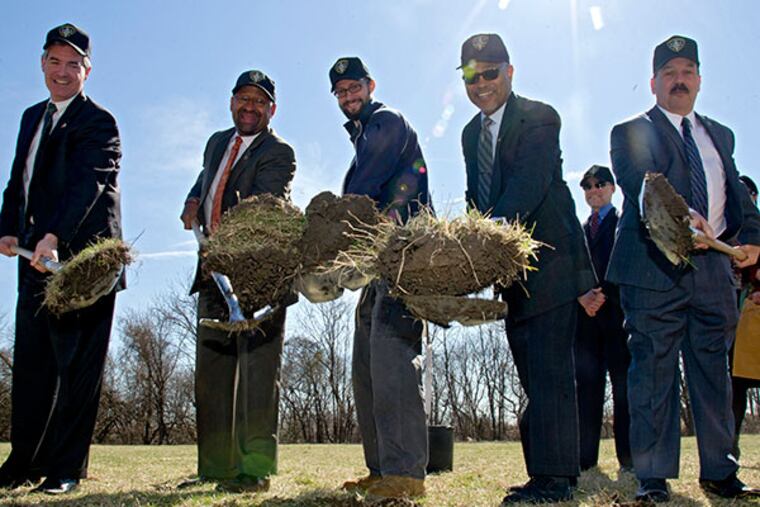Philly prison orchard to cultivate skills and jobs
PHILADELPHIA On a grassy field outside the Philadelphia Industrial Correctional Center, where the windows are narrow, the brick walls run high, and the barbed wire seems to twist around the metal fences forever, inmate Joseph Saunders stood shoulder to shoulder Tuesday with Mayor Nutter.

PHILADELPHIA On a grassy field outside the Philadelphia Industrial Correctional Center, where the windows are narrow, the brick walls run high, and the barbed wire seems to twist around the metal fences forever, inmate Joseph Saunders stood shoulder to shoulder Tuesday with Mayor Nutter.
Saunders, 30, told the mayor of his plans after June, when he is set to be released from prison, after a yearlong burglary sentence.
"I want to start my own composting business," he said. "And it's because of my 10 months here."
Nutter was at the Northeast Philadelphia facility to break ground on the Philadelphia Prison Orchard Project, a program that will train inmates in landscaping and horticulture and hopefully get them ready for jobs once they get out.
The orchard will give inmates job skills that Nutter called critical for reentry into the workforce.
"It's essential that we prepare our returning citizens for employment in many communities across Philadelphia," the mayor said. "This is a winner all the way around."
For Melvin Morris, 56, composting has done more than just help pass the time.
"I've been coming to jail since the '70s, and it's time to stop," said Morris, who expects to be released later this year after completing his latest drug sentence. "I want a job, and, hopefully, this will help."
A partnership of the mayor's office, prison system, federal Environmental Protection Agency, and the Philadelphia Orchard Project - a nonprofit that plants orchards throughout the city - the undertaking is Nutter's latest effort to address the needs of inmates and ex-offenders. In October, Nutter issued an executive order making it city policy to use the term returning citizen rather than ex-offender on all written material from the city.
The orchard, to be created on two acres of prison-owned property, will bring several hundred fruit-bearing trees and berry bushes to the now-barren land. Starting in the fall, the grass field, bordered by woods and a creek, will be lush with rows of apples, pears, figs, kiwis, grapes, and raspberries. The fruit will go to the prison system and area food banks.
Once it is up and running, the orchard will operate alongside the system's existing composting and recycling programs. Several years ago, Philadelphia's prisons received a $15,000 EPA grant to start a composting project, which converts food waste into reusable material for local greenhouses.
Some inmates spend several hours a day working on the composting project.
"I fell in love with it right away," Saunders said. "It's nice just being outside."
Saunders, Morris, and three other inmates, each clad in bright-orange jumpsuits, stood out Tuesday in a crowd filled with environmental workers, city officials, and correctional officers.
Kim Jordan, treasurer of the Philadelphia Orchard Project, said the project would benefit everyone involved.
"It's giving people who might otherwise be stuck indoors all day a chance to get outside and work," she said. "It's a good thing to do."